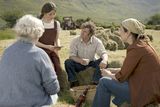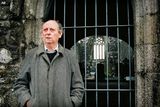John McGahern’s That They May Face the Rising Sun on film: ‘It’s a trip down memory lane’
Barry Ward on the challenge of bringing back a lost rural way of life in Pat Collins’ new adaptation



It’s only April but I’m already pretty sure what the best Irish film of 2024 will be. Pat Collins’ That They May Face the Rising Sun is so good, so confident in its storytelling and so clear in its intentions that it’s hard to imagine a better homegrown feature appearing before the end of the year.
Back in 2005, Collins released A Private World, a mesmerising profile of John McGahern. The great novelist died a year later, but his final book, That They May Face the Rising Sun, stayed with Collins, who for years dreamed of turning it into a feature film. Now he has succeeded, triumphantly.
Barry Ward and Anna Bederke play Joe and Kate Ruttledge, a young couple who leave London to live in Joe’s native Leitrim townland. It’s the 1980s, times are hard and the locals wonder if Joe had a screw loose returning to live in this economically stagnant backwater. Joe’s a writer, Anna’s an artist and over time they manage to earn the affection of most of their neighbours.
They are befriended by Jamesie and Mary Murphy (Phillip Dolan, Ruth McCabe), a kindly old couple who dote on them, but must work harder to win the respect of Patrick Ryan (Lalor Roddy), a sharp-witted, mercurial handyman. When death comes, the community draws together to absorb the loss, summoning old songs and customs to ease the pain.
Today's News in 90 seconds - 19th April 2024
Nothing much happens and yet it is entirely engrossing. Through Joe’s kindly gaze we get a bird’s eye view of a long-gone way of life, and of never-changing human foibles. Ward’s role requires him to watch closely and say little, no easy task for an actor.
“For me,” Ward admits, “that was a challenge, because Joe is so still and patient. I’m urban and I drink too much coffee and I’m extremely fidgety. But where we were shooting, the community of cast and crew made it all much easier for me. And it’s very rare that you get to do a movie where you’re not having to play high drama, with high stakes and emotionally draining scenes.
“This was all about observing, listening, responding. My co-star Anna Bederke is very Zen and Buddhist in her ways, and she just brought an energy that was easy for me to slip into, and help us to kind of create that couple together. And that was exactly what was needed, because we’re the linchpin in a way, around which everything else revolves, and you can have these sometimes larger-than-life characters coming in and bouncing off us two. Our job was to accommodate that.”
Though McGahern’s fictional world is rooted in Co Leitrim, where he lived and ran a small farm, That They May Face the Rising Sun was filmed elsewhere. “We shot in Co Galway, along the Mayo border, a beautiful part of the world. McGahern’s world is very much Leitrim, but the locations we found were in Connemara, and you can see why when you watch the movie.
“Because the story is set in a time before mass rural electrification in Ireland, you have to find a place where you can point the camera into a big wide vista and not have any telegraph poles. And that’s not easy.”
John McGahern in 1998. Photo: Tony Gavin
Ward’s character, Joe, could easily be seen as a proxy for McGahern, an affable man who liked to live among ordinary rural people and watch how they went about their business. Did that affect his performance?
“The character of Joe is very much autobiographical,” Ward agrees, “but in the book, there are only one or two passing mentions of what he does, and he’s like a copywriter or something, that’s what he writes. But Pat thought it would be much more interesting if he’s writing a novel, and it’s more in keeping with the theme of the film we were making.
“I knew Pat’s documentary on McGahern and saw it years ago, but I didn’t rewatch it or base my performance on him as a physical entity, it was more the mental approach — I think that was certainly a factor. At one point Pat was toying with the idea that because Joe was an observer of everything, perhaps the entire movie has sprung from Joe’s imagination. And there’s a truth in that somewhere, in that he is kind of writing about what he sees.”
As it slowly unfolds, Rising Sun gives us tantalising insights into a now largely vanished rural way of life. Lalor Roddy’s character Patrick Ryan is a jobbing handyman who does not suffer fools lightly. When Joe goes to visit him at Christmas, we see his spartan lodgings — a frosty cottage with no central heating or plumbing, where he has lived alone for many years.
Read more
“It’s so rich, the detail of all that, how sparse it is,” Ward says. “And the movie is kind of a paean to that way of life. I’m a Dub, but my folks are rural, Roscommon and Louth, so my childhood was spent in very similar scenarios, where you would have these old bachelors coming to visit and regaling my auntie with all the news, small-town gossip in some ways but just brilliantly delivered by these natural storytellers. So it was like a trip down memory lane for me in many ways.”
Though there is some scepticism among the locals about Joe and Kate and how long they will manage to stick around, slowly, by increments, they become accepted in the townland’s wider community.
“Éamon Little, who co-wrote the film with Pat, said to me after the shoot that if it’s about anything, it’s about belonging; the drama revolves around Kate and Joe’s attempts at becoming part of something bigger. And at the end of the film, we were thinking, well that’s it, that’s total inclusion in the community.”
That scene, a wake, is beautifully done, and has much to say about the deeper traditions of rural life, and the quiet comforts available to those who live close to nature.
“There’s something really haunting and elegiac about it, with the rosary and everything,” Ward says. “I’ve attended a couple of similar events in real life myself, where there’s this mantra that creates a really interesting headspace.”
Before Pat Collins began his shoot, he gathered crew and cast for a brief period of rehearsal. “We had a week together before shooting began, which was really useful: we all kind of hung out and read the script and did some isolated scenes from it, and a John McGahern expert came in and gave us a talk. It was very helpful, to have a chance to just be in that world and soak it up before filming began.
Barry Ward in That They May Face the Rising Sun, based on John McGahern's final novel
“And then I would do my own rehearsal, I would sit for hours writing, to get that body, to get to know what it’s like to sit and write for ages, because it’s not something I’d find very easy.”
The movie premiered at the London Film Festival last November, a nervy experience for all concerned. “I’d watched it on a laptop on my own — and then to see it on a big screen with an audience, I just thought, ‘wow’. But right from the get-go, this film lulls you into this space, this slower pace, so it really requires you to see it in a cinema with phones off and no opportunity to scroll. You’ve got to go with it, and a cinema helps you along that way, I think.
“The tensest moment is when you see it with an audience for the first time, because that’s the final piece of the jigsaw, really, when you make a movie. So it was a huge relief, and it was so joyous, the London screening — the response was just so warm. And in this era of constant streaming, and people just trying to grab your attention, there’s a kind of necessity for a film like this now that’s just so differently paced.”
At a gala screening at the Dublin Film Festival in February, Pat Collins and his cast brought their film home.
“In Dublin, I’m coming into it with family and friends, very confident that we have a good movie on our hands. And of course, with an Irish audience, a lot of them will have some experience of a similar kind of place the movie depicts, and it’s not something you’ve seen on the screen that often. I can’t wait to get it out there, to be honest.”
Join the Irish Independent WhatsApp channel
Stay up to date with all the latest news



















